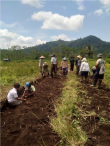The COVID-19 pandemic has also been affecting Indonesia. The first case of infection was detected in Jakarta on 2 March 2020. Many more cases were detected since then, almost in all areas of Indonesia, both in city and rural areas. The Indonesian government had since declared the status of COVID-19 emergency status, and have made policies and took actions relevant to the situation. Schools, workplaces, places of worship, and other public centers were closed for two weeks. Localized lockdowns are also being implemented to prevent further spread of the virus.
Responses of the Government
Social Distancing and Physical Distancing. On March 15, Indonesian President Joko Widodo released a statement that promoted people to keep a social distance. People are encouraged to work, study, and to pray from home. All activities involving many people must be postponed.
Re-allocation of Governmental Budgets at the National and Local levels. On March 18, the Indonesian government announced a decision to re-allocate 1.79 billion USD for Covid-19 relief5. The decision has also been supported by the parliament. This policy includes 700 billion rupiahs of budget re-allocation at Agriculture Ministry and 22.8 trillion rupiahs at Village Ministry.
Challenges Affecting Family Farmers and People in Rural Areas
Challenges on social distancing. Not all companies and institutions are allowing their workers to work from home. People working in informal sectors are especially prone to income loss. People like farmers and fisherfolks do not have options to work at home either. That’s why many people are reluctant to stay at home despite the government’s encouragement and campaign.
How the government actually and literally used ‘social-distancing’ wording did not help either. Sociologists are criticizing that many Indonesian people, especially those living in rural areas, are not familiar with English. They then encourage promoting the policy in Bahasa Indonesia and if necessary in local languages used by people.
Ensuring that budget-reallocation are meeting farmers’ interests and needs. Re-allocation of budgets of Agriculture Ministry and Village Ministry is not automatically relevant to farmers’ interests and needs. Advocacy actions are still needed especially at the local level where the actions are taken.
Good Practices in Government’s Response
The government have chosen social and physical distancing instead of locking down red-zone areas. Indonesian government deemed it as most effective for Indonesia. The government realizes that many smallholders earn their income from daily wages, and they will not be able to work if the region were quarantined.
Budget re-allocation both at the national and local levels is allowing village funds (under the authority of Village Ministry) to be used in more specific ways that help rural people including farmers cope with the COVID-19 impact.
Opportunities for Farmers
Social and physical distancing measures have increased sales of agriculture product in marketplace. Many people are isolating themselves and shop online for their logistical needs, including for foods.11 Farmers and farmer-led cooperatives can also provide delivery service to the consumers.
The ministry provide list of activities and project guidance on how the village fund can be used for COVID-19 relief at village level, especially prioritizing labor intensive projects which will provide additional income for rural people.
Actions Taken by Farmers Organizations and Members

Women members of the Aliansi Petani Indonesia (API), organized in CLG Karya Bersatu, Blitar District – East Java, are selling their organic rice to consumers through door-to-door marketing and delivery.
Farmer members of API are involved in the village fund reallocation process in their respective villages and areas. Farmers are proposing specific labor-intensive projects relevant to their interests and needs, such as irrigation development/rehabilitation projects, developing road to farmers’ field, etc. Farmers are also able to earn additional income by working in these projects since the village fund guidance requires the use of local resources and local labor.
IPPHTI/JAMTANI
To promote awareness on the importance of frequent hand washing with soap and using hand sanitizer and disinfectant in preventing the transmission of COVID-19, JAMTANI created a video on the process of making hand soap, sanitizer and disinfectant and published it online. They also conducted awareness discussions with their members and people in the community.
SPI



Comments are closed